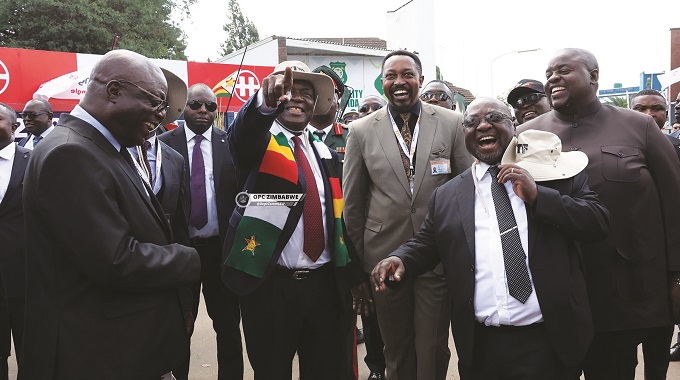Gender violence survivors form all-female anti-poaching unit

Thandeka Moyo- Ndlovu, Chronicle Reporter
GENDER-based violence (GBV) in Zimbabwe often creates broken women who can be social misfits but for survivors in wildlife conservation, such social ills have evoked the spirit of nurturing wildlife which is constantly under attack in the country.
They call themselves Akashinga (translated to the brave one in ChiShona) and their resilience has earned them international recognition in anti-poaching activities.
The all-female anti-poaching squad is made up of survivors of sexual and physical abuse, wives of poachers in prison, widows and orphans, unemployed single mothers, abandoned wives and sex workers who despite social problems have been at the forefront of curbing one of Zimbabwe’s environmental threats.
Not only have they braved psychological and physical trauma, which is a result of their circumstances, they are the only female group in the world who have dedicated their lives to fight poachers.
Their exploits can serve as a beacon of hope for thousands of GBV survivors, most of whom are literally destroyed emotionally and suffer in silence.
As the world marks 16 Days of Activism against GBV between 25 November and 10 December, those who are still carrying the heavy yoke of brutalisation at the hands of those supposed to protect and love them, can get inspiration to seek help from the Akashinga crew.
Dubbed Zimbabwe’s pride in wildlife conversation, the squad has been featured in international magazines including National Geographic and the BBC 60 Minutes projects.
The “girls” who are recruited between the ages of 18 and 30 operate from the Phundundu Wildlife Area, a 115-square-mile former trophy hunting tract in the Zambezi Valley ecosystem.
In its first two and a half years Akashinga helped drive an 80 percent downturn in elephant poaching in Zimbabwe’s Lower Zambezi Valley, one of the largest remaining populations left on earth according to the International Anti- Poaching Foundation (IAPF) founder, Mr Damien Mander.
Mr Mander is an Iraq war veteran who served as a Naval clearance diver and special operations sniper for the Australian Defence Force.
In 2009 while travelling through Africa, he was inspired by the work of rangers and the plight of wildlife which led him to liquidate his life savings just to defend nature.
He also took a bold step in resolving that he would engage the most vulnerable women in rural society and give them an opportunity to pick their broken pieces and contribute to the cause of saving wildlife for future generations.
In 2017 the IAPF’s Akashinga programme was born and the first all-female, armed anti-poaching unit in the world was recruited and trained in an abandoned trophy hunting reserve in Zimbabwe.
“So, we have 138 security law enforcers helping to conserve wildlife in partnership with the Hurungwe, Nyaminyami and Binga District Councils and this foundation is also operational in the USA, Australia, Kenya and Mozambique,” says Mr Mander.

The Akashinga crew in training
“We decided to deploy an all women team to restore and manage a reserve that was historically used for elephant hunting. This formed the Akashinga model and we intend to recruit about 1 000 women by 2030,” he adds.
In conservation, IAPF says women are outnumbered by men in front-line roles by as much as 100:1.
By empowering rural women, Mr Mander says the Akashinga programme motivates improved healthcare, skills development, children staying in school, rape and sexual assault prevention, increased life expectancy, disease and poverty reduction and structured family planning.
The women who have graduated from the Akashinga programme receive law enforcement training and fulfil the same role as a male ranger, learning skills such as leadership, unarmed combat, patrolling, camouflage and concealment, first aid, dangerous wildlife awareness, democratic policing, search and arrest, human rights, crime scene preservation, crisis management, firearm safety and use, information gathering and conservation ethics.
Mr Mander adds that those who qualify as rangers often undergo rigorous training which would for some be not suitable for women but he is proud to say his team of rangers had been able to withstand all the pressure that comes with the job.
“We do our training internally, we have facilities in Hurungwe District, we have 16 instructors and 6 of those are women and already two of our squad members went to Kenya for a speciality course to hone their skills on wildlife conservation. We recruit teams from across the country and at the moment we have 138 law enforcers who are dedicated to bring an end to poaching.”
He says that the foundation also works with the Zimbabwe Parks and Wildlife Management Authority to reduce poaching incidents around their areas of jurisdiction.
“We have 220 arrests so far and we managed to bring back some of the wildlife that had moved due to trophy hunting within the wildlife reserve. We are also working on having 20 reserves by 2025 from abandoned hunting areas with a staff of over 1 000 and we need 95 percent of those of those to be women from the local communities surrounding our area,” he says.
The establishment of IAPF in Zimbabwean communities has also brought development to the women who have since resumed school, bought properties and some studying towards their first degrees.
Mr Mander says his wish is to see members of the community benefitting from the foundation’s project and eventually empowering the rangers to rise from their past hurts and challenges and take active roles in bringing about change.
“We provide paid employment to locals and ensure that every Akashinga ranger we educate, train and deploy, lives in the community where she works.
About 62 percent of all operational costs of the Akashinga model go directly back to the local community, with 80 percent flowing through to the household level,” he says. So far IAPF has managed to assist the surrounding communities with development projects and the creation of nutrition gardens.
“We have put out the call to local communities to offer paid employment to local people in labour and construction roles to help build our training camps, furniture, facilities and to repair and construct roads to provide easier access for local communities to trade and commute.
Additionally, we are developing or repairing local water supplies, creating extensive vegetable gardens and equipping a local medical clinic with supplies to ensure the health and safety of the community and the Akashinga rangers.”-@thamamoe










Comments